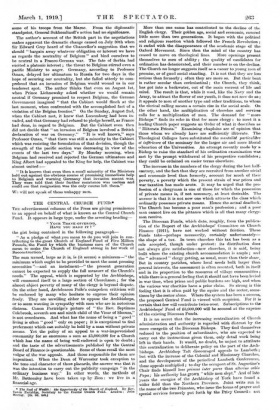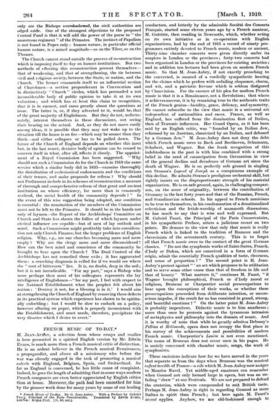THE CENTRAL CHURCH FUND!'
THE advertisement columns of the Press are giving prominence to an appeal on behalf of what is known as the Central Church Fund. It appears in large type, under the arresting heading- " Vous THANE-or mania, Have YOU issue iT t "
the gist being contained in the following paragraph-
" As a pledge of what you mean to do you will join in con- tributing to the great Church of England Fund of Five Million Pounds, the Fund by which the business men of the Church mean to make the Church of England strong in her work of Reconstruction."
The sum named, large as it is, is (it seems) a minimum—" the minimum which ought to be provided to meet the most pressing necessities "—and an instalment—" the present generation cannot be expected to supply the full measure of the Church's needs." The appeal, which is supported by the Archbishops, will commend itself to a large section of Churchmen ; for the almost abject poverty of many of the clergy is beyond dispute. On the other hand, Archdeacon Peile's outspoken criticism will be endorsed by many who hesitate to express their opinion freely. They are unwilling either to oppose the Archbishops, or to seem wanting in sympathy with men who are in notorious distress. Canon Partridge's picture of " the Rev. Septivaus Colebrook, seventh son and ninth child of the Vicar of Slocum," is not overdrawn. And what has the name of being a " good " living is often " good " only on paper ; it is exceptional to find preferment which can suitably be held by a man without private means. Yet the policy of an appeal to a war-impoverialwil community for so enormous a sum as £5,000,000 for a Church which has the name of being well endowed is open to doubt; and the taste of the advertisements published by the Central Board of Finance is questionable. Some of these recall the most vulgar of the war appeals. And those responsible for them are impenitent. When the Dean of Worcester took exception to the tone and character of these placards, the answer was that it was the intention to carry out the publicity campaign "in the Ordinary business way.' In other words, the methods of Mr. Bottemley have been taken up by Zion : we live in a financial age.
• TA. Soul of MIMI.: Sao Opportunity el tir Mara% of England. By Bay. Canon Partridge. Secretary to the CenaC Chorea Pond. London: John lea dd. mai
More than one cause has oontributed to the decline of the English clergy. Their golden age, social and economic, covered little more than two generations. It began with the petitionl and religious reaction which followed the French Revolution ; it ended with the disappearance of the academic stage of the Oxford Movement. Since then the mind of the country has ceased to move on theological linos. More openings present themselves to men of ability ; the quality of candidates for ordination has deteriorated, and their number is on the decline. The Church no longer suggests itself as a career to young men of promise, or of good social standing. It is not that they are lees serious than formerly ; often they are more so. But their bent is rather secular than ecclesiastical ; the Church, they think, has got into a backwater, out of the main current of life and mind. The result is that, while it used, like the Navy and the Army, to attract the flower of our youth, it does not now do so ; it appeals to men of another type and other traditions, to whom the clerical calling means a certain rise in the social scale. On the other hand, the multiplication of churches and services calls for a multiplication of men. The demand for " more Bishops" finds its echo in that for more clergy : to meet it a leading Church paper suggests an Order of what it describes as "Illiterate Priests." Examining chaplains are of opinion that those whom we already have are sufficiently illiterate. The Theological Colleges have substituted the mentalite particuleire et infirieure of the seminary for the larger air and more liberal education of the Universities. An attempt recently made by a Bishop to raise the standard of his ordination examination was met by the prompt withdrawal of his prospective candidates ; they could be ordained on easier terms elsewhere.
The increase in the numbers of the clergy during the last half- century, and the fact that they are recruited from another social and economic level than formerly, account for much of their poverty, a poverty which the present strain of war prices and war taxation has made acute. It may be urged that the pro- fession of a clergyman is one of those for which the possession of private means is, if not necessary, at least desirable. Thu answer is that it is not now one which attracts the class which ordinarily possesses private means. Hence the actual deadlock. The Church has become a poor man's profession ; and a poor man cannot live on the pittance which is all that many clergy. men receive.
The Diocesan Funds, which date, roughly, from the publica- tion of the Report of the Archbishops' Committee on Church Finance (1911), have not worked without Motion. These Funds take—perhaps necessarily, certainly unfortunately— the shape of a tax. In town churches this tax has been as a rule accepted, though under protest: its distribution does not always give satisfaction—new churches, it is said, being built where the existing church accommodation is ample ; and the " advanced " clergy getting, as usual, more than their share, But in country parishes, where local needs bulk larger than general interests, the assessment is often resented, both in itself and in its proportion to the resources of village communities ; while there is a general feeling that it should not have been levied in war time, when prices and public burdens are high, and when the various war charities have a prior claim. So strong is this feeling that it is often paid by the squire and the rector, some- times by the rector alone. Where the system has been a success, the proposed Central Fund is viewed with suspicion. For it is certain that few will contribute twice over. Subscriptions to the Arohbishops' Fund of £5,000,000 will be secured at the expense of the existing Diocesan Funds.
It is no secret that the increasing centralization of Church administration and authority is regarded with distrust by the more energetic of the Diocesan Bishops. They find themselves reduced to the position of subordinates, who are expected to carry out the instructions given them, only detail work being left in their hands. It would, no doubt, be unjust to attribute this centralisation to deliberate policy on the part of the Arch- bishops. Archbishop Tait discouraged appeals to Lambeth ; but with the increase of the Colonial and Missionary Churches, and the development of the periodical Lambeth Conferences, these appeals multiplied ; te.day the occupant of St. Augustine's Chair finds himself leas primes inter pares than alteriat mins papa; his authority has grown "while men slept." And of late years the energies of the Archbishop of York have found a wider field than the Northern Province. Joint write run in the name of the two Primates, who issue the forms of prayer and special services formerly put forth by the Privy Council : not
only are the Bishops overshadowed, the civil authorities are edged aside. One of the strongest objections to the proposed Central Fund is that it will add the power of the purse to " the monstrous regiment " of the Primates. The instinct of Papalism is not found in Popes only : human nature, in particular official human nature, is a mixed magnitude—as on the Tiber, so on the Thames.
The Church cannot stand outside the process of reconstruction which is imposing itself to-day on human institutions. But two methods of effecting this reconstruction present themselves— that of weakening, and that of strengthening, the tie between civil and religious society, between the State, o• nation, and the Church. The former commends itself to an influential section of Churchmen—a section preponderant in Convocation and In distinctively " Church " circles, which has persuaded a not inconsiderable body of public opinion to take it at its own valuation ; and which has at least this claim to recognition, that it is in earnest, and cares greatly about the questions at issue. The latter is, or, if they adverted to it, would be, that of the great majority of Englishmen. But they do not, =fortu- nately, interest themselves in these discussions, not seeing their bearing on the actual. And, as they do not move easily among ideas, ft is possible that they may not wake up to the situation till the house is on fire—which may be sooner than they think—and either collapses or has to be pulled down. The future of the Church of England depends on whether this inert but, in the last resort, decisive body of opinion can be roused to concern itself iu what, after all, affects it closely. The appoint- ment of a Royal Commission has been suggested. " Why should not such a Commission do for the Church in 1919 the same service which a similar body did in 1835--examine thoroughly the distribution of ecclesiastical endowments and the conditions of their tenure, and make proposals for reform ? Why should not Parliament include in its schemes of reconstruction a measure of thorough and comprehensive reform of that great and ancient institution on whose efficiency, far more than is commonly realized, the social health of the community depends " In the event of this wise suggestion being adopted, one condition is essential : the nomination of the members of the Commission must not be left to the Primates. It should be in the hands not only of laymen—the Report of the Archbishops' Committee on Church and State has shown the follies of which laymen under clerical influence are capable—but of men of lay outlook and mind. Such a Commission might profitably take into considera- tion not only Church Finance, but the larger problems of English religion. Why, e.g., are our churches becoming more and more empty ? Why are the clergy more and more disconsidered ? How can the best mind and conscience of the community be brought to bear upon the Church ? The Dual Control of the Archbishops has not remedied these evils ; it has aggravated them: a searching diagnosis is called for if we would see where the " root of bitterness" lies. It is, no doubt, deep in the soil ; but it is not ineradicable. "For my part," says a Bishop who more perhaps than most of his colleagues represents the lay intelligence of Englishmen—" for my part, I feel with respect to the National Establishment what the prophet felt about his nation : ' Destroy it not, for a blessing is in it.' I would aim at strengthening the Church of England by removing those defects in its practical system which experience has shown to be spiritu- ally enfeebling : but I would be slow to embark on a policy, however alluring on paper, which is properly inconsistent with the Establishment, and must needs, therefore, precipitate the very disaster which I desire to avert."



































 Previous page
Previous page